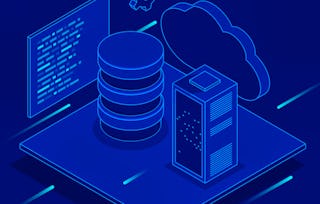This Azure training course is designed to equip students with the knowledge need to process, store and analyze data for making informed business decisions. Through this Azure course, the student will understand what big data is along with the importance of big data analytics, which will improve the students mathematical and programming skills. Students will learn the most effective method of using essential analytical tools such as Python, R, and Apache Spark.

Data Processing with Azure

Data Processing with Azure
This course is part of Microsoft Azure: AI, Infrastructure, and Data Solutions Specialization

Instructor: LearnQuest Network
7,810 already enrolled
Included with
67 reviews
What you'll learn
Configure batch processing with Databricks and Data Factory on Azure
Use ETL and ELT to load and transform data
Create linked services and identify pipelines for data stored within Data Factory
Explain Data Virtualization in PolyBase
Skills you'll gain
Details to know

Add to your LinkedIn profile
7 assignments
See how employees at top companies are mastering in-demand skills

Build your subject-matter expertise
- Learn new concepts from industry experts
- Gain a foundational understanding of a subject or tool
- Develop job-relevant skills with hands-on projects
- Earn a shareable career certificate

There are 8 modules in this course
This Azure training course is designed to equip the students with the knowledge need to process, store and analyze data for making informed business decisions. Through this Azure course, the student will understand what big data is along with the importance of big data analytics, which will improve the students mathematical and programming skills. Students will learn the most effective method of using essential analytical tools such as R, and Apache Spark.
What's included
1 video
One of the primary benefits of Azure Databricks is its ability to integrate with many other data environments to pull data through an ETL or ELT process. In module course, we examine each of the E, L, and T to learn how Azure Databricks can help ease us into a cloud solution.
What's included
5 videos3 readings1 assignment1 plugin
Processing big data in real-time is now an operational necessity for many businesses. Azure Stream Analytics is Microsoft’s serverless real-time analytics offering for complex event processing. In this section we examine how customers unlock valuable insights and gain competitive advantage by harnessing the power of big data.
What's included
4 videos3 readings1 assignment2 plugins
A data factory can have one or more pipelines. A pipeline is a logical grouping of activities that together perform a task. The activities in a pipeline define actions to perform on your data. Before you create a dataset, you must create a linked service to link your data store to the data factory. This section deals with linked services and data sets within Azure Blob Storage.
What's included
5 videos1 reading1 assignment2 plugins
Azure Data Factory is a fully managed, cloud-based data orchestration service that enables data movement and transformation. In this section, we explore scheduling triggers for Azure Data Factory to automate your pipeline execution.
What's included
5 videos1 reading1 assignment2 plugins
In time-streaming scenarios, performing operations on the data contained in temporal windows is a common pattern. Stream Analytics has native support for windowing functions, enabling developers to author complex stream processing jobs with minimal effort. In this section, we study windowing functions related to in-stream analytics.
What's included
5 videos1 reading1 assignment3 plugins
This section teaches how to analyze phone call data using Azure Stream Analytics. The phone call data, generated by a client application, contains some fraudulent calls, which will be filtered by the Stream Analytics job.
What's included
7 videos1 reading1 assignment3 plugins
Traditional SMP data warehouses use an Extract, Transform and Load (ETL) process for loading data. Azure SQL Data Warehouse is a massively parallel processing (MPP) architecture that takes advantage of the scalability and flexibility of compute and storage resources. Utilizing an Extract, Load, and Transform (ELT) process can take advantage of MPP and eliminate resources needed to transform the data prior to loading.
What's included
4 videos1 reading1 assignment1 plugin
Earn a career certificate
Add this credential to your LinkedIn profile, resume, or CV. Share it on social media and in your performance review.
Instructor

Offered by
Explore more from Cloud Computing
 Status: Free Trial
Status: Free Trial Status: Free Trial
Status: Free Trial Status: Preview
Status: Preview Status: Preview
Status: Preview
Why people choose Coursera for their career

Felipe M.

Jennifer J.

Larry W.

Chaitanya A.
Learner reviews
- 5 stars
38.80%
- 4 stars
26.86%
- 3 stars
13.43%
- 2 stars
5.97%
- 1 star
14.92%
Showing 3 of 67
Reviewed on Apr 28, 2021
This course gave a detailed overview of Microsoft azure,

Open new doors with Coursera Plus
Unlimited access to 10,000+ world-class courses, hands-on projects, and job-ready certificate programs - all included in your subscription
Advance your career with an online degree
Earn a degree from world-class universities - 100% online
Join over 3,400 global companies that choose Coursera for Business
Upskill your employees to excel in the digital economy
Frequently asked questions
To access the course materials, assignments and to earn a Certificate, you will need to purchase the Certificate experience when you enroll in a course. You can try a Free Trial instead, or apply for Financial Aid. The course may offer 'Full Course, No Certificate' instead. This option lets you see all course materials, submit required assessments, and get a final grade. This also means that you will not be able to purchase a Certificate experience.
When you enroll in the course, you get access to all of the courses in the Specialization, and you earn a certificate when you complete the work. Your electronic Certificate will be added to your Accomplishments page - from there, you can print your Certificate or add it to your LinkedIn profile.
Yes. In select learning programs, you can apply for financial aid or a scholarship if you can’t afford the enrollment fee. If fin aid or scholarship is available for your learning program selection, you’ll find a link to apply on the description page.
More questions
Financial aid available,

